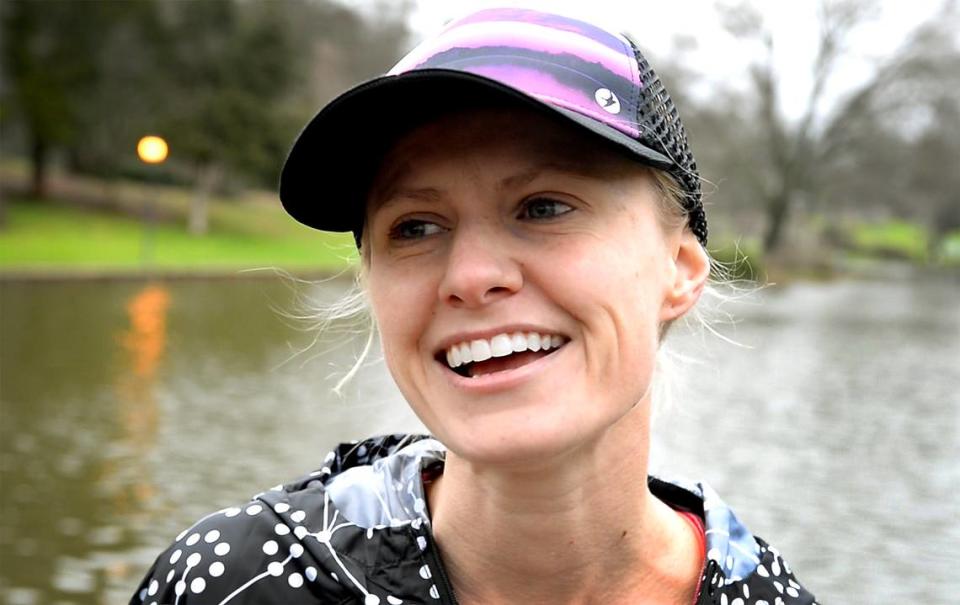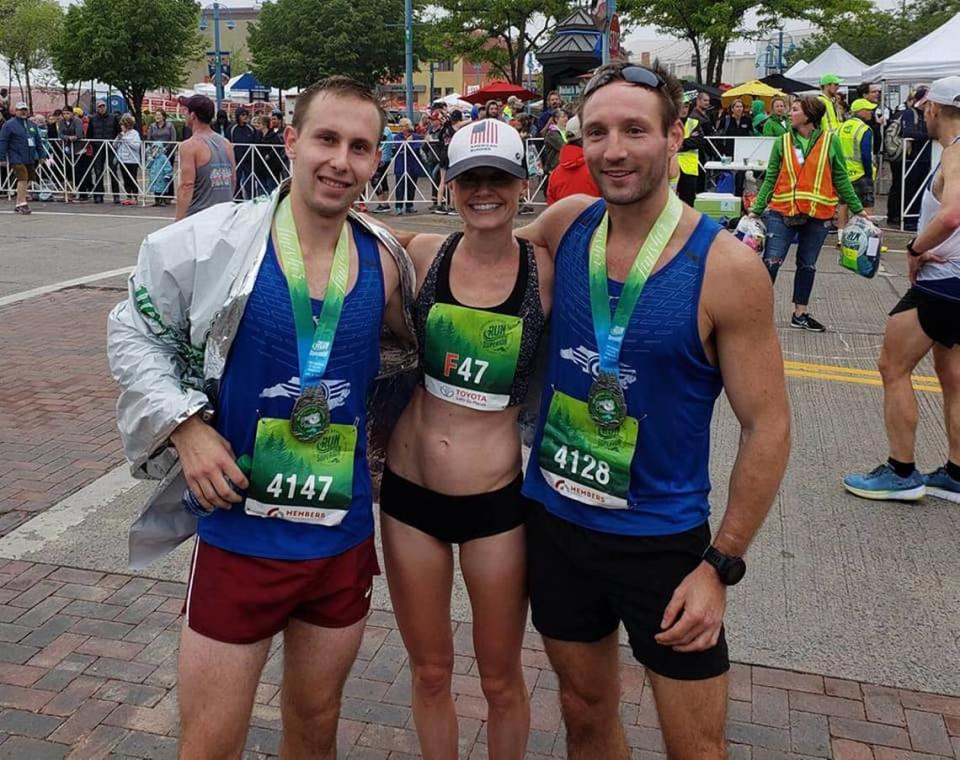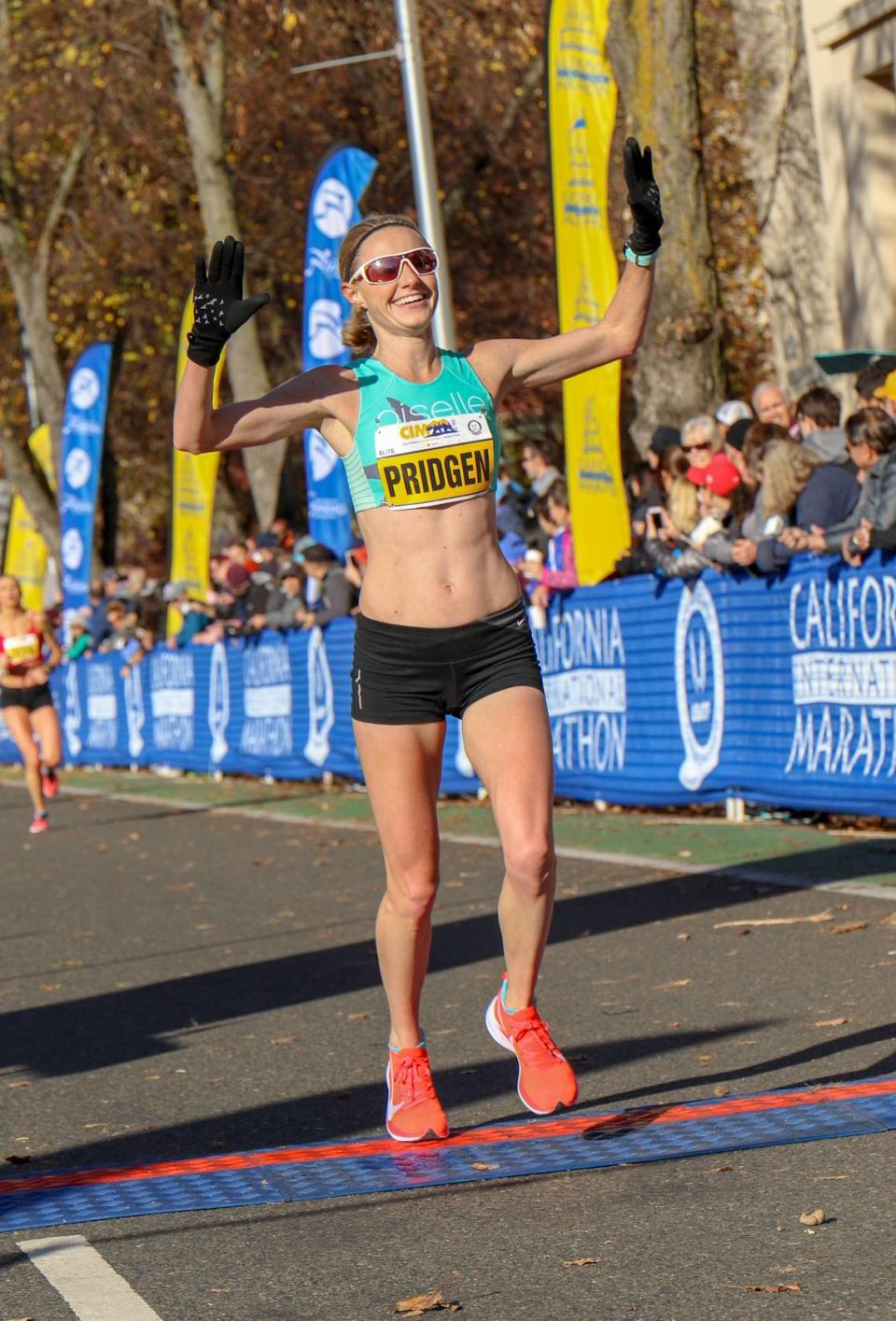She used library books to learn how to run. Next, she’s racing at the Olympic Trials.
If Paula Pridgen enters herself into a road race in Charlotte, she instantly becomes the odds-on favorite to be the first woman to reach the finish.
At the marathon distance, meanwhile? Even on a national level, she’s an ace.
Take the TCS New York City Marathon this past November, for instance, when she was the ninth American woman across the line while posting a personal-best in 2 hours, 40 minutes and 4 seconds. That time — and this should impress the vast majority of folks who have ever clocked themselves on a run — averages out to 26 (point-two) consecutive miles at a 6-minute-and-7-second pace.
But when Pridgen steps into the starting corral at the U.S. Olympic Marathon Trials in Atlanta next Saturday, it’ll be much harder for her to stand out, because the Charlotte area’s only entrant will be joined by 510 of the very fastest female marathoners in the country.
And although by certain measures one could forecast that she might wind up in the top 15 to 20 percent of the field, the reality is that her chances of punching a ticket to Tokyo are only slightly better than her chances of winning the lottery, since only the fastest three will get to represent the U.S. in Japan this summer.
Sorry, Grandma.
“My grandmother likes to say, ‘My granddaughter’s trying out for the Olympics!,’” Pridgen says, laughing. “I mean, technically that’s true, but ...
“I do try to always tell people, ‘Um, don’t be disappointed if I don’t make the Olympics.’ Even my mom, when I first qualified, she was like, ‘So, what are the next steps?’ I said, ‘What do you mean what are the next steps?’ She was like, ‘You know, to go the Olympics.’ I said, ‘Wellllll, yeah, the top three will go to the Olympics, Mom, but I don’t have a shot.’ And she was like, ‘Oh. (Insert pause here, for effect.) So then what’s the point?’”

‘It’s prestigious just to qualify’
The point, explains the 33-year-old consumer finance supervisor, is that SHE QUALIFIED FOR THE U.S. OLYMPIC MARATHON TRIALS.
Sure, it’s a bigger club than ever before — a record number of women made it in this year, by running a marathon in 2:45 or faster (or, in some cases, a half marathon in 1:13 or faster). But by any measure it’s an impressive group, and Pridgen’s time in New York didn’t just get her in by the skin of her teeth; it gave her a cushion of nearly five minutes.
“I try to compare it to Boston, since a lot of people know about the Boston Marathon,” she says of the Trials. “It’s very prestigious to qualify for the Boston Marathon. But after people qualify, they go run Boston not because they think they’re gonna win Boston, but just because it’s a cool race to run. It’s prestigious just to qualify to be there.”
In her case, just being there at the Trials is particularly amazing considering that she didn’t start running until much later in life than most of the other women she’ll toe the line with.
(A quick note, by the way: If you don’t want to learn more about her trajectory and just want to hear her more-philosophical thoughts on running and on her plans for the Trials, skip ahead — the second half of this piece is a Q&A that sheds light on all that.)
While growing up in Rocky Mount, Pridgen swam, cheered and played tennis, but admits she wasn’t anywhere close to a star in those sports.
She didn’t get her first taste of running until she was at UNC Chapel Hill, where she studied business administration as an undergrad. Of course, it was nothing like the running she does today: She started going out at the urging of a roommate who was looking for company, though they were fairly casual and sporadic jaunts.
Eventually, after earning her master’s in accounting from Chapel Hill in 2009, Pridgen went to work for a public accounting firm in Charleston, S.C., and in August 2010, on no training, she finished fourth out of 200 women in a 5K in nearby Summerville.
The next month, having been talked into doing the run leg on a company relay team at a triathlon in Kiawah Island, she put up a time in her 10K leg that was fast enough to raise more eyebrows — averaging, she says, about 7 minutes per mile for a 10K. So she got talked into anchoring the team again the following year.
Asked how she would explain those excellent early performances, being that there are plenty of runners with many years of experience who can’t go that fast in a 10K? Pridgen says, matter-of-factly: “Base miles from recreational running for general fitness combined with having some natural running ability.” (Safe to say that “some” is an understatement.)
Anyway, despite those flashes of extraordinary potential, she continued her rudderless relationship with the sport. It wasn’t until the summer of 2012 — about six months after she moved to Charlotte to work as a tax associate for PwC — that she finally started to get somewhat serious about it.
Once again, it stemmed from a little peer pressure.
‘Let’s just do a full’
Pridgen was hanging out at a pool in South End, enjoying her carefree 20s and drinking IPAs in the middle of the day, when a friend mentioned she was planning to do Charlotte’s Thunder Road Half Marathon and that Pridgen should do it, too.
Thinking that maybe it would be a good way to motivate her to run more consistently, Pridgen agreed to sign up that night. When she got on the website and realized the event also offered a full marathon, though, it didn’t take her long to make the call that any self-respecting overachiever (and yes, she cops to being one) would make: Let’s just do a full.
“Honestly, I could not have sworn exactly how far a marathon was when I signed up for it,” she says, laughing.
Even so, by the time she got to race day that November, she probably started smarter than any other first-timer out there, having used a training plan she found on MarathonRookie.com and armed with the knowledge gleaned from hours and hours spent devouring books about training that she’d checked out from the county library in uptown.
In the end, she also probably finished faster than any other first-timer out there, running a stunning 3:16:11 that was good for fourth place overall.
And in the 7-1/2 years since, Pridgen has made astonishing strides in the marathon, both figuratively and literally.
She set a goal of breaking three hours in her next attempt, at the Marine Corps Marathon in October 2013, and ran 2:56:05. That caught the attention of the Charlotte Running Club, which invited her to start running with its faster folks. Through them, she then found out that if she ran a 2:45, she could qualify for the U.S. Olympic Trials — and that sounded pretty cool, so she set a goal of breaking 2:45.
As it turned out, this would take a little longer, due in part to the fact that she was sidelined by multiple stress fractures and then a serious melanoma scare, both in 2014. She made a comeback three years later, at Chicago in October 2017, missing the mark by less than 3-1/2 minutes.
But in her fourth marathon — the relatively-flat-and-fast Grandma’s Marathon in Duluth, Minn., in June 2018 — Pridgen nailed a 2:43:09 to punch her 2020 Trials ticket. Five and a half months later, she improved her qualifying time by a minute and 40 seconds at Sacramento’s point-to-point, net-downhill California International Marathon.

Then she ran 2:41:36 on a hilly course in Boston last April, and followed it up with another PR this past November on a challenging route traversing the five boroughs of New York, where she had been invited to participate as an elite (meaning the body that puts on the race, the New York Road Runners, paid for her flight, her hotel accommodations and her meals).
Not bad, certainly, for someone who never was on any type of track or cross-country team, and not bad, definitely, for someone who ran her first marathon seven years earlier using training advice gleaned from tips from borrowed library books.
So now what?
In Paula Pridgen’s own words
Pridgen is currently employed by an N.C.-based consumer finance company that was founded by her parents, a job that most often sees her working out of the house in Dilworth she shares with her fiance, Franklin Keathley (who she met, by the way, after joining the Charlotte Running Club). Typically, she sits at her laptop in running clothes.
She considers running her “second job that I sometimes get paid for,” she says, laughing. Then after a brief pause, adds: “Or more like rarely get paid for.”
Still, she’s pretty good at it: She’s No. 78 on World Athletics’ ranking of U.S. women marathoners, and has a sponsorship deal with women’s running apparel company Oiselle.
But don’t expect her to quit her day job. And again, don’t expect her to make it to the Summer Games in Tokyo.
In a recent conversation with the Observer, she explains why — and answers a few other burning questions, too.
Q. Do you wish you had started running earlier in life, and gotten serious about running sooner?
I would say in general, yes. Maybe now I’d be running low-2:30s — who knows? And I think if I’d have started in high school, I probably would have been good enough that I could have run in college. I could have really enjoyed having those memories, and being a part of a team in high school and college. But the flip side of it, too, is that so many women who run in high school and college wind up burnt out. Or maybe I would have had a really bad injury. There’s so many issues with women’s sports in high school and college — and specifically in running — where a lot of women, they’re encouraged to be super-super-thin, and they’re malnourished, and they’re suffering all sorts of stress fractures and other injuries. That’s something that I’ve never really had to deal with, because I’m not part of a team, and I don’t have a coach who’s pressuring me to lose weight.
Q. You don’t use a coach at all, right?
I have before, but not now, no. I know sometimes people feel like they need a coach, and I get that, but I think I’ve proved that you don’t necessarily need a coach. I think it’s more important to take personal responsibility. ...
I’ve really enjoyed learning about what makes you faster, and what are all the different training methods out there. And then sitting down at my computer about once a week and mapping out my training for that week. But even then, I’ll plan my week, and then I totally change stuff. It depends on how I feel. Like, I’ll just go out for a run and not necessarily know how far I’m gonna go and make a decision when I’m out there, based on how I’m feeling. Or when I do a workout, I might be like, “OK, we’re gonna scrap this part. That’s good enough.” (Laughs.)
I’m not opposed to having a coach in the future, I just haven’t really found anyone that’s a really good fit. And part of it, too, is that I don’t want to be a disappointment. ... So in general, it’s a little less stressful to not have a coach.
Q. Going back to what you were saying about weight — have you ever struggled with body-image issues?
Fortunately, I’ve never had an eating disorder, or any kind of huge struggle with that. I definitely think I worry a lot less about how my body looks, and I’m more concerned with how my body performs. I mean, I probably worry that people look at me and think maybe I’m too skinny, but I feel like I eat a lot of food. In fact, I probably eat a lot of food that’s really not that healthy for me — I probably could cut back on some of the French fries, and fast food, and beer. My fiance and I, we eat an absurd amount of Pio Pio takeout. ...
I’m naturally plus or minus 105 pounds. I stay around there. But I’ve kind of always taken the philosophy, too, that I’d rather get on the starting line a pound or two overweight than underweight. I stay around there. Would I run a little faster if I were down to 100 pounds? Probably. But I just don’t want to start playing this game where it’s like, “Let me see if I can lose some weight.” I’m not really at that level, that I feel like I need those extra seconds, honestly.
Q. But you are an overachiever, right?
(Laughs.) Yeah. It’s like, if I’m gonna do something, I want to do it well. Like, when I signed up for my first marathon, I just committed to wanting to do it well, to do it right.
Q. And at that point you fully had caught the running bug. What was it about it?
Part of it is just that you can get so much satisfaction out of it. In life, a lot of times people work really, really hard for something, and the result doesn’t really reflect what they deserve. But in running, there’s just that time on the clock. There’s no disputing it. That’s what you did today. It’s kind of like taking a Scantron test. That’s your score. That’s what you did. It doesn’t always work out. Running can break your heart, especially in a marathon. But there’s a lot of satisfaction that comes with working hard for something, and then seeing the result.

Q. So then what’s your goal for the Trials?
Yeah, like I said, people are kind of wondering, “Well, what’s your goal if you aren’t gonna place Top 3?” And I think that’s a valid question. But what’s really cool about the Trials is you have the best American marathoners there, so it’s neat just to see how high you can place. I’m sure they’re gonna assign us bib numbers based on either where our ranking is going in, or maybe by qualifying time ... in which case you can look at, “Am I beating my bib number?” Or with the U.S. rankings in the marathon, “Let’s see if I can finish higher than 78th.” So that’s what I think is driving the training and the focus a lot is just, “Where do you stack up against the best marathoners in the country?” ...
I mean, the women who are really in the running to make it, this is their full-time job. They will have finished the workout I did this morning, but then they’re gonna be going to physical therapy and getting massages and taking naps. They’re not gonna, like, go home, take a shower real quick and go to work all day like I am.
Q. Do you have any interest in becoming a full-time professional marathoner?
At this point in my life, no, no. I work for my family’s company, and I’m not stepping away from that. In running, only the really, really top marathoners make a good living. Most of the rest — even though they’re elite marathoners — they aren’t making the kind of living that you need to make to support a family. It’s a great, I think, job for if you’re right out of college. You can go do that for a few years and then hope to make it big. But where I am in my life — 33, almost 34 years old — I’m not gonna leave my current job to then try to go strike out and see if I can also make a living in the marathon, no. But it’s a great second job. (Laughs.)
Q. Does it feel like work to you, though? It seems like it’s something you genuinely enjoy.
Yeah, oh my gosh, even if I weren’t running competitively, I would still be running every day. And you really find out how much running means to you when you get injured — knock on wood, I’ve been really, really fortunate the past few years to be really healthy, but when I have gotten injured and I can’t run, it’s just amazing how bad I feel mentally. I joke about how running is like a natural antidepressant, and I feel sorry for everybody out there who can’t run all the time. Because it just makes you feel so much better.
About the 2020 Trials
The men’s and women’s marathons will take place in Atlanta on Feb. 29. The top three in each race will automatically qualify for the Olympics. NBC will broadcast the event beginning at noon.

